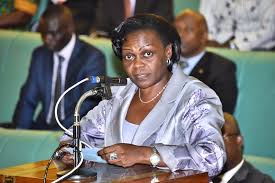Uganda’s Minister of Health, Sarah Opendi, has called for the legalization of abortion, saying the move would help reduce the rising number of women and girls dying from unsafe, illegal abortions performed by unqualified people in villages.
Speaking during a recent health conference in Kampala, Opendi said it was time for Uganda to confront the realities surrounding women’s reproductive health instead of ignoring them.
“We are losing many women — young girls, mothers, and students — to unsafe abortions carried out secretly by untrained people,” the minister said. “If abortion were legalized and properly managed in hospitals by trained doctors, we would save many lives.”
Abortion remains illegal in Uganda under the Constitution and the Penal Code Act, which provides for up to 14 years in prison for anyone who attempts to procure an abortion.
However, the law allows the procedure only in cases where it is necessary to save the life of the mother.
Despite this, unsafe abortions remain common — with the World Health Organization (WHO) estimating that thousands of Ugandan women are hospitalized every year due to complications from unsafe abortion practices.
Women’s rights activists, several NGOs, and a section of female Members of Parliament have for years pushed for the government to reform abortion laws, arguing that criminalization has only made the practice more dangerous and expensive.
Opendi clarified that efforts to review Uganda’s abortion laws are not being pushed by foreigners, as some critics have claimed.
“This is not a ploy by Europeans or any foreign agenda,” she said. “It is a local health concern. As a country, we must address the causes of maternal mortality, and unsafe abortion is one of them.”
The minister added that a policy discussion is already underway to consider medical and legal frameworks that could guide the safe provision of abortion services under strict conditions.
Public health experts say unsafe abortion is one of the leading causes of maternal deaths in Uganda, accounting for nearly 10 percent of such deaths annually.
They argue that legalization — combined with proper education, access to contraception, and counseling — would drastically reduce preventable deaths.
Dr. Judith Kiconco, a reproductive health specialist at Mulago National Referral Hospital, said that while moral and religious beliefs continue to influence the abortion debate, the human cost of unsafe abortions cannot be ignored.
“We are talking about young girls dying in backrooms because they fear being arrested,” Dr. Kiconco said. “This is not about promoting abortion; it’s about saving lives and protecting women’s dignity.”
Globally, abortion remains a deeply divisive issue. While many Western countries have legalized it, several African nations, including Uganda, still maintain restrictive laws.
Recently, international organizations and UN member states under the “New World Order” health framework have urged governments to promote reproductive health rights, including access to safe abortion where necessary.
Uganda, however, continues to face religious and cultural opposition to the idea, with church leaders warning that legalization could “encourage immorality” and undermine family values.
Beyond abortion, health experts have urged Ugandans to adopt healthy lifestyles to reduce the risk of chronic diseases.
Doctors at Mulago Hospital emphasize maintaining a healthy weight through proper diet and regular exercise to prevent diabetes, heart disease, and chronic kidney disease.
They also warn that excessive salt intake, smoking, and alcohol abuse increase the risk of high blood pressure and kidney failure.
The World Health Organization recommends reducing salt consumption to less than 5 grams per day to lower such risks.
Regular blood sugar and blood pressure checks, avoiding unnecessary painkillers, and drinking enough clean water are also essential to maintaining kidney health, experts added.
As Uganda grapples with maternal deaths, poverty, and poor access to healthcare, Opendi’s call for abortion legalization has reignited a sensitive but vital national conversation.
For the minister, the issue is clear:
“Our goal is not to promote abortion,” she said. “Our goal is to save lives.”



